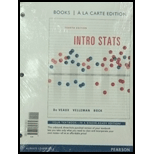
Concept explainers
Grocery shopping Many grocery store chains offer customers a card they can scan when they check out and offer discounts to people who do so. To get the card, customers must give information, including a mailing address and e-mail address. The actual purpose is not to reward loyal customers but to gather data. What data do these cards allow stores to gather, and why would they want that data?
What data the stores gather with the card and the reason why the data is gathered.
Answer to Problem 1E
The what in the data gathered by the store includes the list of items purchased by the customer, the frequency of purchase by a particular customer, the date of purchase, the time of purchase, the locality from which the purchase is made, the locality of residence of the customer, and so on.
The why behind the collection of the data is to use the data to improve the business strategies of the store according to the time, place, and locality.
Explanation of Solution
Given info:
Several grocery store chains offer their customers a card to scan during check-out; they are issued once the customers provide some information about themselves, such as mailing address and e-mail address. The customers who accept the card are given discounts, while the data about the customers is gathered by the store.
Justification:
The grocery store chains typically have several stores scattered over the whole country. Once a customer is issued a card, by taking their mailing address and e-mail address, the customer becomes a unique identity. Whenever the card is scanned after purchase, the store automatically gets the whole data regarding the purchase of the customer.
Thus, an answer to what data that is collected includes the list of items purchased by the customer, the frequency of purchase by a particular customer, the date of purchase, the time of purchase, the locality from which the purchase is made, the locality of residence of the customer, and so on.
The stores aim at increasing their business profits. The complete information about each individual’s purchase helps the store to create a customer profile. The store management can decide customers of which age-group and gender buy which type of article. Determining which articles are frequently bought together helps the store management to arrange their goods in such a way that the goods attract the most attention; it also helps to decide which items to put on discount. This data helps the store management to decide on their advertisement policies, as well.
All this information is gathered to address the question why behind the collection of the data; that is, to use the data to improve the business strategies of the store according to the time, place, and locality.
Want to see more full solutions like this?
Chapter 1 Solutions
Intro STATS, Books a la Carte Plus New Mystatlab with Pearson Etext -- Access Card Package
Additional Math Textbook Solutions
College Algebra Essentials (5th Edition)
Probability And Statistical Inference (10th Edition)
APPLIED STAT.IN BUS.+ECONOMICS
Precalculus
Introductory Statistics
A Problem Solving Approach To Mathematics For Elementary School Teachers (13th Edition)
- Should you be confident in applying your regression equation to estimate the heart rate of a python at 35°C? Why or why not?arrow_forwardGiven your fitted regression line, what would be the residual for snake #5 (10 C)?arrow_forwardCalculate the 95% confidence interval around your estimate of r using Fisher’s z-transformation. In your final answer, make sure to back-transform to the original units.arrow_forward
- BUSINESS DISCUSSarrow_forwardA researcher wishes to estimate, with 90% confidence, the population proportion of adults who support labeling legislation for genetically modified organisms (GMOs). Her estimate must be accurate within 4% of the true proportion. (a) No preliminary estimate is available. Find the minimum sample size needed. (b) Find the minimum sample size needed, using a prior study that found that 65% of the respondents said they support labeling legislation for GMOs. (c) Compare the results from parts (a) and (b). ... (a) What is the minimum sample size needed assuming that no prior information is available? n = (Round up to the nearest whole number as needed.)arrow_forwardThe table available below shows the costs per mile (in cents) for a sample of automobiles. At a = 0.05, can you conclude that at least one mean cost per mile is different from the others? Click on the icon to view the data table. Let Hss, HMS, HLS, Hsuv and Hмy represent the mean costs per mile for small sedans, medium sedans, large sedans, SUV 4WDs, and minivans respectively. What are the hypotheses for this test? OA. Ho: Not all the means are equal. Ha Hss HMS HLS HSUV HMV B. Ho Hss HMS HLS HSUV = μMV Ha: Hss *HMS *HLS*HSUV * HMV C. Ho Hss HMS HLS HSUV =μMV = = H: Not all the means are equal. D. Ho Hss HMS HLS HSUV HMV Ha Hss HMS HLS =HSUV = HMVarrow_forward
 Holt Mcdougal Larson Pre-algebra: Student Edition...AlgebraISBN:9780547587776Author:HOLT MCDOUGALPublisher:HOLT MCDOUGAL
Holt Mcdougal Larson Pre-algebra: Student Edition...AlgebraISBN:9780547587776Author:HOLT MCDOUGALPublisher:HOLT MCDOUGAL Glencoe Algebra 1, Student Edition, 9780079039897...AlgebraISBN:9780079039897Author:CarterPublisher:McGraw Hill
Glencoe Algebra 1, Student Edition, 9780079039897...AlgebraISBN:9780079039897Author:CarterPublisher:McGraw Hill Big Ideas Math A Bridge To Success Algebra 1: Stu...AlgebraISBN:9781680331141Author:HOUGHTON MIFFLIN HARCOURTPublisher:Houghton Mifflin Harcourt
Big Ideas Math A Bridge To Success Algebra 1: Stu...AlgebraISBN:9781680331141Author:HOUGHTON MIFFLIN HARCOURTPublisher:Houghton Mifflin Harcourt Functions and Change: A Modeling Approach to Coll...AlgebraISBN:9781337111348Author:Bruce Crauder, Benny Evans, Alan NoellPublisher:Cengage Learning
Functions and Change: A Modeling Approach to Coll...AlgebraISBN:9781337111348Author:Bruce Crauder, Benny Evans, Alan NoellPublisher:Cengage Learning



